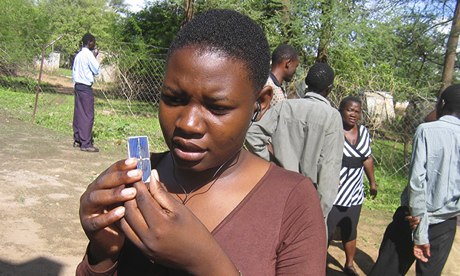
An MP3 player, a cable and speakers: for rural communities in Zimbabwe these are the indispensable providers of information on crop production, livestock care and personal hygiene.
In Humbane, a village nearly 50 miles from the gold-mining town of Gwanda in the Matabeleland South province – a drought-prone area – villagers say that the introduction of podcasts a year ago by Practical Action in conjunction with a local organisation, Moruti we Sechaba, has made a huge difference to their lives.
Humbane is on a rough dirt road and temperatures can hit 36C: the area is on the same beltline as the bordertown of Beitbridge, where temperatures reach 40C. As she ushers us into her yard, Tibelelo Tlou, 45, a mother of three and a primary school teacher at Bengo, is energetic and eager to show off the impact the podcasts have had on her family, despite the heat.
Four small buildings are in the fenced area that make up her home. "You see that toilet over there, the white one? I had it built after my husband told me of what he had learnt from the podcasts," she said, with a proud smile. "We have learnt so many things on personal hygiene and our lives have improved a lot. Now some of the podcasts even teach us about children's rights and as a result I now know how to take better care of mine."
Tlou said her husband was the first to attend the podcast meetings in the village. "I'm always busy at work and also taking care of the children, so he told me what he had learnt," she said.
The podcasts are broadcast in isiNdebele, the most common local language spoken in the southern part of Zimbabwe. The topics covered include health, farming, water and sanitation and livestock care, and each podcast lasts for 30 minutes.
The project was set up at a cost of $7,500 by Practical Action. Each podcast costs $200 and the information is recorded and uploaded on to the MP3 players by the Ministry of Agriculture. Experts trained by Practical Action to operate the MP3 players, such as Zechariah Ngulube, disseminate the information across Humbane, home to 1,500 people.
Accessibility and transportation, however, remain a key challenge for Ngulube and his team of three. Ngulube points out that they have to walk at least 10 miles to reach the different areas of Humbane, with each member doing five sessions per month.
"We have so far been able to reach a sizeable number of people with the podcasts, but people are disappointed if you do not get to them as transport is a major issue for us," he said.
"Everyone wants to listen to the podcasts because they have seen change in the lives of all who have been attending the sessions. Many people are now using toilets, and those who did not have them are now constructing toilets. The effect of the podcasts has been a reduction in disease and the people are much healthier now."
Village elders and chiefs have stepped in to help Ngulube's team and now ask them to attend community gatherings where they are given a chance to podcast information after the official business of the day is concluded.
"Working hand in hand with village elders has been a great opportunity, as we have used the meetings to podcast at community meetings. In these meetings an excess of 300 people are present," said Ngulube.
Sipho Nare, another of the team members, says they take down questions that listeners may have and put them to officials from Practical Action and the ministry of agriculture.
"The value of the podcasts is that they are reversible, unlike radio programmes which do not allow a repeat. But, sadly, having only four podcast machines in the whole villages is too little and we need more," said Nare.
The podcasting technology has been duplicated by Practical Action in Zimnyama, and Bulilimangwe near Plumtree, a border town next to Botswana, Zimbabwe's western neighbour. The challenges of accessibility, transport and limited equipment seen in Humbane are also present in Zimnyama, which is more than a dozen miles out of Plumtree town.
Patience Nyathi, from the Ministry of Agriculture, said that the podcasts began a year ago, but the resources available were no longer able to satisfy the huge demand. "We only have five machines, which are operated by five people and are meant to service a community of 1,000. One of the machines has broken down and this is a big challenge for us," said Nyathi.
"So far, only those who have been trained have the machines, and we would be glad if these could be extended to more people, so that people can listen any time they want to the podcasts and not have to wait for days when the knowledge facilitators from Practical Action visit."
Rixon Matengarufu, the project manager for the podcast project in Gwanda and Plumtree, said the project, initially a pilot, had received an overwhelming response from the communities where it had been set up.
"This technology will remain sustainable in rural communities in Zimbabwe as long as new material is continuously being recorded. That is why we have created a communication hub in Gwanda, which will continue to provide new recordings to teach the people," he said. "We want to expand to other rural areas in Zimbabwe in the new year and have already concluded training in Mwenezi and want to open a podcast site in Buhera as well. Our hope is that there will be increased participation by more government ministries in the future."

